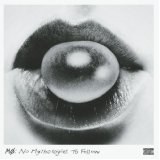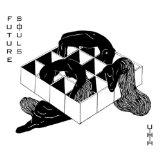 On paper at least it would appear that MØ is unlikely to deviate much from what is a well-established and superior brand of Scandi-pop. With this album being three years in the making, the Copenhagen based twenty-five year old has had time to hone her preferred blend of r’n’b pop with trap leanings and an occasional wander into 1960s reverb-heavy girl group territory. Her competition is undoubtedly strong; Lykke Li, Annie, Robyn and Oh Land to name a few of the female singers who have already demonstrated their worth in the genre over the last decade. But MØ can thankfully hold her own more often than not on this, her debut album, “No Mythologies to Follow”.
On paper at least it would appear that MØ is unlikely to deviate much from what is a well-established and superior brand of Scandi-pop. With this album being three years in the making, the Copenhagen based twenty-five year old has had time to hone her preferred blend of r’n’b pop with trap leanings and an occasional wander into 1960s reverb-heavy girl group territory. Her competition is undoubtedly strong; Lykke Li, Annie, Robyn and Oh Land to name a few of the female singers who have already demonstrated their worth in the genre over the last decade. But MØ can thankfully hold her own more often than not on this, her debut album, “No Mythologies to Follow”.
Album opener “Fire Rides”, one of the new songs which represent the minority here, as over half the album has already been released, is a perfect introduction to MØ’s style and sound. Following a near acapella flurry of swooping, angelic vocals, stop-start post Timbaland beats hit hard against the melancholic melody line before a rave synth adds another, more angular dimension to the chorus. It may sound crowded but it’s a sublime merging of styles. Most impressive of all though are MØ’s vocals, full bodied and soulful with an impressive and expressive range that her contemporaries can’t match. The apocalyptic metaphors on “Fire Rides” are bought to life with her possessed performance on the haunted and yearning verses:
‘What’s it gonna be with the violence?
What’s it gonna be when the fire rides in?
What’s it gonna be when the sound of you and I die out?’
“Maiden”, “Pilgrim” and “Waste of Time” are all previous singles and further represent MØ’s fixation with the music she grew up with. Much like Grimes, contemporary futuristic r’n’b and hip hop have been essential influences to her along with electronic pop music and an ability to subvert these genres subtly and without irony but with heart; this is her specialty. “Maiden” introduces a classic nylon-strung guitar sound that crops up more than once in the album’s playing time and it’s to her credit that she applies these odd stylistic flourishes to her sound and makes it something that is identifiable to her and without contrivance. Producer superstar Diplo appears on the brassy and low-slung “XXX 88” and it’s maybe not surprising that it’s the most commercial moment here but also completely in keeping with the sonic themes of the album. “Don’t Wanna Dance” and the slowly chiming “Never Wanna Know” in particular pay a brilliant homage to Motown and girl group dilemmas and sonics. Both tracks are wonderfully conceived and a perfect for MØ’s longing and alienated vocals, “Never Wanna Know” has a divine spoken interlude that draws the line from The Shangri-Las to All Saints, it may be an easy pull but it certainly hits in all the right places
‘All of a sudden I was brain dead and rotten
With thoughts of you and I
And I wanted to ‘goodbye’ you
But the nights are so cold
How I missed your human soul
I would never let you go if I’d been a little older’
he less successful songs here, and there only a few, are also the newer ones. “Red in the Grey” has a pretty straight forward trap arrangement but is more of a re-tread of earlier material rather than a fresh update. “Dust is Gone” continues with the sixties thread but the lack of a strong song and Lana Del Rey aping render it redundant karaoke. The clanking and clapping “Walk this Way” and the gorgeous “Slow Love” with its opulent, misty funk fare much better. Compare any of these tracks though to the older and eccentric “Glass”, the closing song here, with its deeply disconcerting festive synth hook, massive pop chorus and general oddness, and these tracks fail to fully measure up.
“No Mythologies To Follow” may not be as instantly gratifying as one may have expected given a genre that all too often and easily is written off as disposable. This is an album that initially is difficult to warm to and a fairly steady mid tempo throughout can provoke a feeling of sameness. This proves to be a strength as opposed to any kind of weakness however as repeated listens reward enormously as buried melodies and hidden embellishments are excitingly revealed over time. MØ has already managed to establish her own style and found a voice which allows her access to the hallowed music hall of Swedish Pop (a copy of Abba’s “The Visitors” is given to all wannabes as homework) but she also cleverly sets herself apart from her contemporaries effortlessly and with some aplomb. MØ is indeed something quite special: an awkward and talented woman challenging her inhibitions and desires through frequently beautiful and slow burning music that is, at times, equally awkward.
 The third album by LA-based female duo Uh Huh Her is meant to be their concession to dance music, not that you couldn’t play their previous material in a club but “Future Souls” is intended to take you further into the realm of abandoned dance floor hedonism. Camila Grey and Leisha Hailey should be congratulated for showing restraint and not making the EDM-polluted monstrosity that this could have been. It doesn’t chase trends and there are no David Guetta or will.i.am attempts at shoehorning six different sub genres into a four minute track. But then Uh Huh Her haven’t really made a dance record here at all. This album is in fact more of a continuation of their elegant, electro-pop sound but with considerably more electronics and fewer guitars. Whether it has reinforced and strengthened their position in a very crowded and ambitious arena will be mainly dependent on their songwriting skills and ability to establish a more defined personality – something they have struggled with before.
The third album by LA-based female duo Uh Huh Her is meant to be their concession to dance music, not that you couldn’t play their previous material in a club but “Future Souls” is intended to take you further into the realm of abandoned dance floor hedonism. Camila Grey and Leisha Hailey should be congratulated for showing restraint and not making the EDM-polluted monstrosity that this could have been. It doesn’t chase trends and there are no David Guetta or will.i.am attempts at shoehorning six different sub genres into a four minute track. But then Uh Huh Her haven’t really made a dance record here at all. This album is in fact more of a continuation of their elegant, electro-pop sound but with considerably more electronics and fewer guitars. Whether it has reinforced and strengthened their position in a very crowded and ambitious arena will be mainly dependent on their songwriting skills and ability to establish a more defined personality – something they have struggled with before.
An interesting reference point here is girl group All Saints, produced by William Orbit; very occasionally the quality comes closer to Orbit’s definitive work with Madonna on “Ray of Light”. It has a late 90’s naiveté both vocally and sonically, which can sound undernourished but can also shine and warm through with harmonies that can swell up unexpectedly, from an intro for example. And there are some good songs here too. Album opener “Innocence”, for example, creates a steady impression and beneath a lightly bouncing acid house synth motif the melodies morph into something smooth but sticky; it’s a surprise when it finally clicks. “Bullet” has a nicely thought out structure and nagging chorus and “Time” sounds a bit like a highly-polished Wendy and Lisa.
For a dance album it’s maybe surprising that the two best songs on “Future Souls” are the most introverted and intimate. “Strange Design” is both nurturing and arms-length, slowly spinning and calm with an obvious deb to the spooked and lush ballads of “Supernature”- era Goldfrapp. “Interconnect” is satisfyingly bolshy, with a cool and confident vocal but it’s still as considered and graceful as anything you would come to expect from the duo’s best material. And that is what reinforces the frustrations experienced elsewhere within the ten tracks found here. The evidence that the band can push themselves to make something memorable and compelling is often undermined by pleasant by completely disposable filler such as the auto tuned cliché of “It’s Chemical” and the thinness of “Nuthin Without Your Love” could be any one of an army of faceless electronics acts.
Uh Huh Her have a sizeable cult following that is undeniably linked to Leisha Hailey’s performance as Alice Pieszecki in the garish but often riveting series, The L Word. Hailey was the only out lesbian playing a lesbian in a show about lesbians. Her character was charismatic and spiky and in many ways the show’s moral compass – if only some of that character’s utter self-possession could be transposed to the duo’s musical ventures. Au Revour Simone, Chvrches and School of Seven Bells should be Uh Huh Her’s synth sisters in crime but where those female lead, synth-preoccupied groups each have an identifiable sound, UHH still suffer from a stranded sense of identity. This could be avoided if, instead of relying on self-production, the women allowed themselves to be guided and pushed by another studio professional. Although “Future Souls” is competent enough, let’s hope that the next album is the one that fully reveals the duo’s idiosyncrasies and tics in ways which are still only hinted at here.
 British pop artist Charli XCX aka Charlotte Aitchison loves a sing-song spoken verse or middle eight, the type that dominates songs like the spectacular “Never Ever” by All Saints or the slightly less spectacular but just as influential “China In My Hands” by eighties favourite T’Pau. They crop up again and again on this, her 3 years in the making debut album, “True Romance” features only 2 songs I haven’t heard before; the danger of releasing mix tapes and singles for years and then deciding to retain them all, also signalling a slight lack of quality control, in one format or another, for your first release proper.
British pop artist Charli XCX aka Charlotte Aitchison loves a sing-song spoken verse or middle eight, the type that dominates songs like the spectacular “Never Ever” by All Saints or the slightly less spectacular but just as influential “China In My Hands” by eighties favourite T’Pau. They crop up again and again on this, her 3 years in the making debut album, “True Romance” features only 2 songs I haven’t heard before; the danger of releasing mix tapes and singles for years and then deciding to retain them all, also signalling a slight lack of quality control, in one format or another, for your first release proper.
Apart from the cartoon rave popping of “Take My Hand” (appropriately enough about taking amphetamines and being unable to stop dancing or get any sleep for many hours; no subtleties here) and the low-fi, underwhelming “Black Roses”, and as far as I’m aware these are also the two ‘new’ tracks, the tempos are all mid and the inspiration seems to be predominantly taken from that mid-nineties girl group sound that incorporated r’n’b and pop before Timbaland and The Neptunes descended from outer space and changed the sound of pop forever at the very beginning of the noughties.
I’m talking “Honey to the Bee” by Billie Piper, Atomic Kitten, The Spice Girls debut album and I mentioned All Saints earlier. What Charli XCX does however is subvert the genre gently by adding some grubby synths, ambient sounds and a sense of alienation and real individuality that you never quite got from Geri Halliwell or Kerry Katona. This, admittedly pretty common, hybrid can work really well and does on a good half of this record, “Stay Away” and “Nuclear Season”, two of the oldest songs here, sound sulky and satisfyingly challenging whilst being built around pure pop structures and “So Far Away” and “Cloud Aura” both steer more towards r’n’b and are instant and substantial. On the current single “What I Like”, Aitchison channels Lily Allen, both of them guilty of masking their social class with their mockney accents and it’s as good as anything Allen put her name to over her brief reign as ruling pop woman.
“You (Ha, Ha, Ha)” is Gold Panda’s insistent, nagging instrumental “You” with singing and is pin-sharp perfection but surely this is in fact a collaboration so Charli XCX can’t take full responsibility for its brilliance. On the previous single “You’re The One” a massive chorus springs out from the doomy verses and is the number 1 Eternal never had, insane pop produced by the man responsible for Robyn’s juggernaut, “Dancing On my Own”. Immediately before and after this track though (its track 10 of 12) things plod and get samey and something I thought was there is actually only apparent in flashes and only fully realised on a couple of tracks.
Come the summer we are all going to be familiar with, love for 15 minutes and then hate “I Love It” by Swedish girl duo Icona Pop (currently I still love it), a track that Charli XCX wrote for the pair and features on, the kind of song that has a life of its own, the Adele affect where you can actually see and experience a song much like any common or garden object but can no longer hear it. It will affect people’s lives, simply put, for better or for worse. There isn’t a song like that on here and maybe Charli XCX doesn’t want that kind of immediate, intensified fame that it could bring but there is enough to make you confident that this is an artist that understands the value and importance of pop and will find a way to keep releasing it to hopefully larger and larger audiences, to be her own smaller and far more thoughtful phenomenon. And you can add another half-star to the rating if you like.


